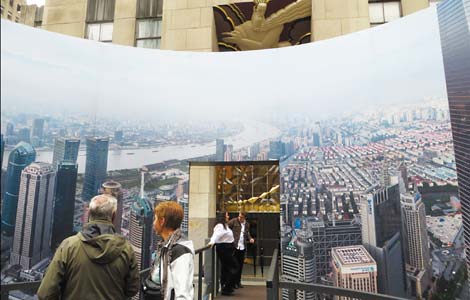From the Chinese Press
Updated: 2013-09-18 07:49
(China Daily)
|
||||||||
Rethink 'traffic congestion fees'
The Beijing environmental authorities recently issued an action plan to improve the city's air quality and asked relevant departments to discuss the possibility of collecting "traffic congestion fees" to reduce pollution, which has been questioned by many, says an article in Guangming Daily. Excerpts:
The Beijing environmental authorities have adopted a series of measures in recent years to ease traffic congestions but still failed to substantially improve the situation. The traffic congestion problem in Beijing is the result of highly concentrated public resources in the city and severely imbalanced distribution of its functional areas.
The urbanization drive in China has made cities increasingly bigger. On the other hand, employment opportunities, and healthcare and education facilities in the satellite cities and suburban areas are still inadequate, widening the distance between people's homes and workplaces.
Therefore, the need to devise a scientific and workable plan to improve opportunities, and public amenities facilities has become more important than ever to ease the traffic congestion problem in cities.
When it comes to imposing the proposed "traffic congestion fees", the authorities have to decide whether public transport vehicles will also have to pay them and who foots the bill. If taxpayers end up paying the "traffic congestion fees" for public transport vehicles, that would be social injustice. In this sense, the proposal to impose "traffic congestion fees" is part of not only an environmental policy, but also a social policy.
Many people who support the proposed fees will cite the examples of the models followed by countries such as Singapore. But since Beijing is a mega-city with a population of 20 million, it would cost an astronomical amount of money to build a public transportation system as convenient as that of Singapore.
The impact of public policies will be different on different social groups. Hence, the authorities must solicit the opinions of all social groups before implementing a social policy. Only if all social groups are taken into confidence can a social policy prove truly successful upon implementation.
(China Daily 09/18/2013 page9)

 All's fare as apps take road to upgrades
All's fare as apps take road to upgrades
 New-energy vehicle policy shifts gears
New-energy vehicle policy shifts gears
 Shipwrecked Concordia declared vertical off Italy
Shipwrecked Concordia declared vertical off Italy
 Thirteen dead in US Navy Yard shooting
Thirteen dead in US Navy Yard shooting
 'Amazing Shanghai' on display in Big Apple
'Amazing Shanghai' on display in Big Apple
 Exporters to face more trade friction
Exporters to face more trade friction
 Watchdog bites with no favor
Watchdog bites with no favor
 Miss New York crowned 2014 Miss America
Miss New York crowned 2014 Miss America
Most Viewed
Editor's Picks

|

|

|

|

|

|
Today's Top News
China's space station to open for foreign peers
Number of China's female billionaires on the rise
Innovation should drive reform: Premier Li
Gun control debate gathers little steam
Don't meddle in HK's affairs, China warns UK
Education elusive for children with disabilities
FDI keeps increasing in August
Health bureau to probe milk powder bribe claim
US Weekly

|

|






